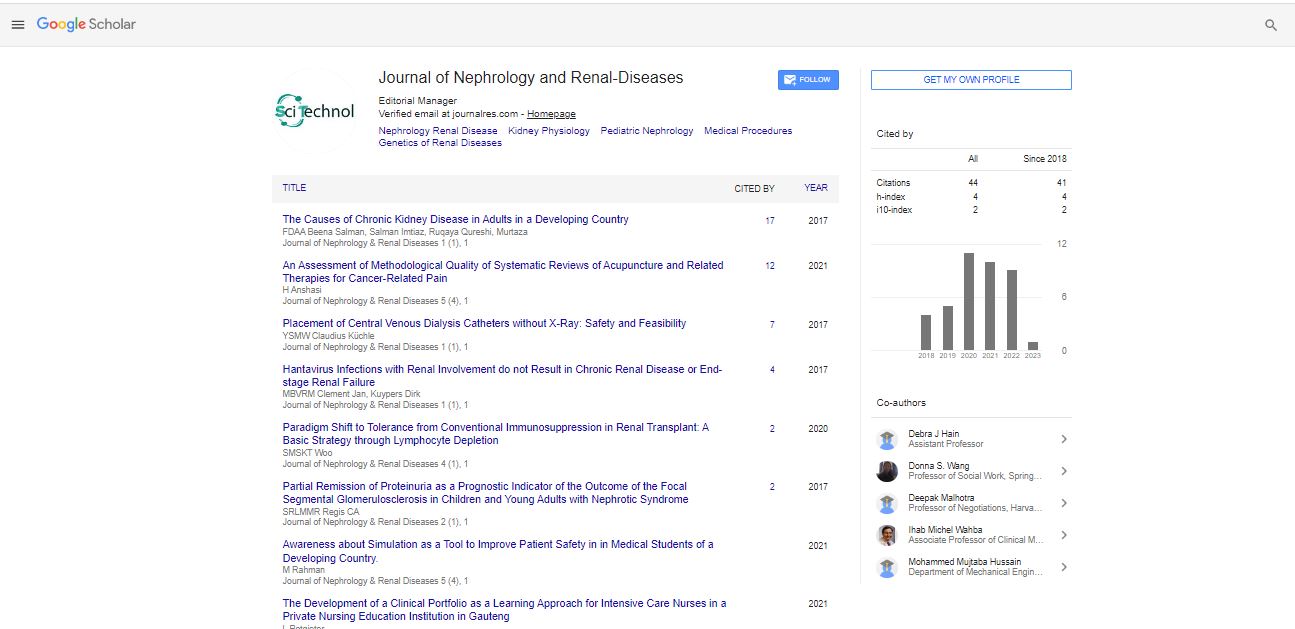Perspective, J Nephrol Ren Dis Vol: 7 Issue: 4
Exploring the Importance of Lipoic Acid in Kidney Disease
Cerqueira Zwierz*
1Department of Physiology, Medical University of Bialystok, Bialystok, Poland
*Corresponding Author: Cerqueira Zwierz,
Department of Physiology, Medical
University of Bialystok, Bialystok, Poland
E-mail: cerqueira.zwierz@umb.edu.pl
Received date: 01 November, 2023, Manuscript No. JNRD-23-123908;
Editor assigned date: 03 November, 2023, PreQC No. JNRD-23-123908 (PQ);
Reviewed date: 20 November, 2023, QC No. JNRD-23-123908;
Revised date: 27 November, 2023, Manuscript No. JNRD-23-123908 (R);
Published date: 04 December, 2023, DOI: 10.4172/2576-3962.1000049
Citation: Zwierz C (2023) Exploring the Importance of Lipoic Acid in Kidney Disease. J Nephrol Ren Dis 7:4.
Abstract
Lipoic acid, also known as alpha-lipoic acid, is a powerful antioxidant that plays a vital role in maintaining cellular health and combating oxidative stress. Recent research has shed light on the potential therapeutic benefits of lipoic acid in kidney disease. The kidneys, essential organs for maintaining overall health, are particularly susceptible to oxidative damage.
Description
Lipoic acid, also known as alpha-lipoic acid, is a powerful antioxidant that plays a vital role in maintaining cellular health and combating oxidative stress. Recent research has shed light on the potential therapeutic benefits of lipoic acid in kidney disease. The kidneys, essential organs for maintaining overall health, are particularly susceptible to oxidative damage. This article explores the multifaceted roles of lipoic acid in kidney function and its implications for preventing and managing kidney diseases.
Oxidative stress and kidney disease
Oxidative stress, characterized by an imbalance between Reactive Oxygen Species (ROS) production and the body's ability to neutralize them, is a common factor in the development and progression of kidney diseases. The kidneys are highly vascular organs with an intense metabolic activity, making them particularly vulnerable to oxidative damage. Conditions such as Chronic Kidney Disease (CKD), diabetic nephropathy, and Acute Kidney Injury (AKI) are often associated with increased oxidative stress.
Lipoic acid as an antioxidant
Lipoic acid stands out for its potent antioxidant properties. It functions as a cofactor for key enzymes involved in energy metabolism, and, critically, it acts as a scavenger of free radicals. Lipoic acid is unique among antioxidants because it is both water- and fat-soluble, allowing it to penetrate various cellular compartments and neutralize a broad spectrum of free radicals. Lipoic acid's ability to neutralize ROS is particularly relevant in the context of kidney disease. By reducing oxidative stress, lipoic acid helps protect renal cells from damage caused by free radicals. This protective effect may contribute to slowing the progression of chronic kidney diseases and preventing acute injuries. Inflammation is closely intertwined with oxidative stress in kidney disease. Lipoic acid exhibits antiinflammatory properties by modulating various signaling pathways and suppressing the production of pro-inflammatory molecules. This anti-inflammatory effect can help mitigate the inflammatory response often associated with kidney damage. Mitochondria, the cellular powerhouses, are crucial for maintaining renal function. Lipoic acid plays a role in preserving mitochondrial function by optimizing energy production and reducing oxidative damage within these organelles. This is particularly important in the context of kidney diseases, where mitochondrial dysfunction is a contributing factor. Diabetes is a major risk factor for kidney disease, and diabetic nephropathy is a leading cause of end-stage renal disease. Lipoic acid has been shown to improve insulin sensitivity and regulate glucose metabolism, potentially mitigating the impact of diabetes on kidney function. The kidneys are involved in filtering and eliminating toxins from the body. Lipoic acid aids in the detoxification process by supporting the liver and enhancing the excretion of harmful substances. Additionally, lipoic acid has demonstrated chelating properties against heavy metals, which can be nephrotoxic and contribute to kidney disease.
Clinical implications
The potential therapeutic roles of lipoic acid in kidney disease have garnered interest, and several studies have investigated its efficacy in various renal conditions. While the results are promising, further research is needed to establish optimal dosages, treatment durations, and potential side effects in diverse patient populations. Studies have suggested that lipoic acid supplementation may have a protective effect on renal function in individuals with CKD. It may help slow the progression of the disease by reducing oxidative stress and inflammation. However, more large-scale clinical trials are needed to validate these findings and determine the long-term effects. Given its impact on glucose metabolism, lipoic acid shows promise in managing diabetic nephropathy. Clinical trials have explored its potential to improve kidney function and reduce urinary albumin excretion in individuals with diabetes. Continued research is necessary to elucidate the underlying mechanisms and confirm its efficacy. Lipoic acid's ability to protect against oxidative stress and inflammation makes it a potential candidate for preventing or mitigating AKI. Studies in animal models have shown positive results, but human trials are needed to determine its effectiveness in clinical settings.
Conclusion
Lipoic acid's versatile antioxidant properties make it a compelling candidate for addressing oxidative stress in kidney disease. From protecting against ROS-induced damage to modulating inflammation and supporting mitochondrial function, lipoic acid offers a multifaceted approach to maintaining renal health. While research is ongoing, the potential therapeutic benefits of lipoic acid in preventing and managing kidney diseases hold promise for improving the lives of individuals at risk of or already affected by renal conditions. As our understanding of lipoic acid's roles in kidney health deepens, it opens avenues for targeted interventions and personalized approaches in the realm of nephrology.
 Spanish
Spanish  Chinese
Chinese  Russian
Russian  German
German  French
French  Japanese
Japanese  Portuguese
Portuguese  Hindi
Hindi 
